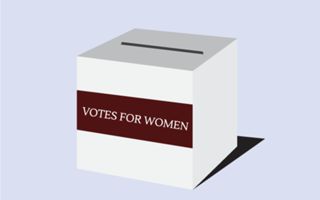From collection Candidates

Mary M. Lilly, a widow, ran successfully for the New York State Assembly in 1918 as a Democrat from the 7th District. She was one of first women to be elected after New York State women won the vote in 1917. Lilly was backed in NYC by the Amsterdam Democratic Club whose members thought, correctly, that she might defeat the incumbent Republican assemblyman who, in his six terms, had opposed suffrage. In this Republican district Lilly won by 229 votes, leaving analysts to believe that Republican women had crossed party lines to cast a vote for her. On August 2, 1918, The New York Times published a short biographical sketch of Lilly. The newspaper reported that Lilly was an alumna of Hunter College. In 1895, she earned a law degree from New York University, where she was the first woman to win a full scholarship to a law school. The New York Times continued to report that Lilly was a member of many prominent women's law clubs, such as the Women's Lawyers Club. On June 7, 1919, a popular women's suffrage magazine, The Woman Citizen, published a feature on Lilly entitled "The Log of a Woman Legislator." The article quoted Lilly in saying these things about her work as both a lawyer and a politician, "The work to me seems fascinating. I love the law whether in making or in interpreting. I am deeply indebted to the political party that nominated me and just as grateful to the voters--men and women--who elected me." The article continued to chronicle Lilly's work in New York's state capital of Albany, where she worked to abolish the death penalty for minors, as well as expedite the passage of the Federal Suffrage Amendment in the United States Senate. Unlike many women at that time, she opposed Prohibition. Lilly also pressured New York to raise the age of delinquency to eighteen, give illegitimate children the right to bear their fathers' names, and their fathers the obligation of paying child support. These efforts failed as did her proposal to require women's night court to have a female judge. The article ended with Lilly stating, "Women are needed in the Legislature at all times--just as they are needed and should be represented in all departments of government, war or no war...The new League of Women Voters is most commendable. In the hands of the women will lie the balance of power; if the vote is used wisely, this woman's league will be able to bring about splendid reforms in both parties." Lilly was also an advocate of mental health issues, and in 1918, the New York Tribune wrote that, not only was she "squarely on the Democratic platform with President Wilson," but she was also vice-president of the Society for the Aid of Mental Defectives. In 1919 a reporter for the New York Tribune wrote that both Lilly and her colleague Ida Sammis "are revealing to the people that women with mature minds, at an age when some women are beginning to worry about crow's feet, can be of real service to the state."





